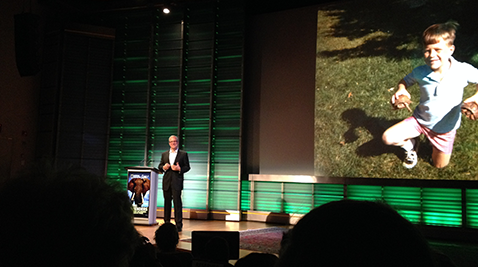
WASHINGTON — “This is a bird-eating tarantula, which … eats birds,” National Geographic’s Bryan Christy said, eliciting nervous laughter from the audience.
Behind him, a screen displayed a photo of him casually handling a tarantula as large as his hand.
Christy then informed the audience that that particular spider defends itself by spraying hairs at threats. The hairs are very small and irritating, and can cause serious damage to the eyes. He was told this after he handled the arachnid.
An investigative reporter and National Geographic fellow, Christy is the director of the publication’s special investigations unit. The initiative was established this year “to expose elephant poaching and combat the illegal wildlife trafficking that’s driving many animals to extinction,” according to National Geographic’s website.
As part of that effort, Christy wrote “Tracking Ivory,” a September cover story in the magazine that detailed the human threat to the world’s remaining elephant population.
Around 30,000 elephants are killed per year, Christy wrote, adding that this past summer, the Tanzanian government stated that in the past five years, the East African country had lost 60 percent of its elephants.
Christy spoke at a National Geographic Live event Thursday evening called “The Defenders: Inside the Wildlife Trade.”
Christy chose to investigate ivory trafficking after finishing a story about reptile trafficking because he knew it would bring in the most public attention. It’s a strategy he got from Will Smith, he said, explaining that he heard that the actor chose to star in science fiction movies because those earned the most money in the film industry.
Christy said he realized this same principle could help him choose what animal to investigate next.
So he looked into which animal trafficking industries brought in the most money and public notice, which led him to elephants, rhinos and tigers. He wanted to be able to get the public and government to focus on the threat to the animals and potential solutions.
“If I tell these stories accurately, you will reach the right conclusion,” he said.
Last week, what was believed to be the largest elephant shot in almost 30 years was killed in a legal hunt in Zimbabwe. The elephant was reportedly between 40 and 60 years old, and conservationists estimate that each of its tusks weighed 120 pounds, according to the Telegraph, a British newspaper.
The Zimbabwean elephant’s death came just months after the killing of Cecil the lion sparked international outrage. The lion was lured from a national park in Zimbabwe and killed. Walter Palmer, the American dentist who hunted and shot the lion, was not charged with poaching because the hunt was technically legal.
When telling stories like these, a writer has to follow a technique similar to that in a TV show revolving around crime: introduce the victim, then go into detail about the perpetrator of the crime, Christy said.
His investigation into the elephant tusk industry brought him to the Lord’s Resistance Army (LRA), an African terrorist group led by Joseph Kony. A defector of the army told him that it’s all “about killing,” whether it was elephants or people. Christy’s investigation revealed that the LRA trades the ivory from the tusks for arms.
He told his listeners that once the information is out there, he doesn’t need to do anything else to get the change he wants.
That’s the main goal of his investigative work, Christy said. When governments see how bad the trafficking problem really is, which they do after reading the stories, they can create change. For example, the Malaysian government passed the first wildlife trade legislation in 40 years as a result of his 2010 story, “The Kingpin,” which revealed that convicted trafficker Anson Wong was still trafficking wildlife.
The U.S. Fish and Wildlife Service, which is responsible for protecting and conserving wildlife in this country, is one of the most poorly funded departments, Christy said. That makes it hard for the agency to do everything that needs to be done.
Before delving into his journalism experiences, he spoke briefly about his youth, when he and his friends would trade reptiles; several turtles equaled a snake, various snakes equaled other, better, snakes, and so forth.
Christy began his career with an undergraduate degree in accounting, before moving to law. With his father’s passing, he decided to follow his passion for writing because he no longer felt obligated to follow in his family’s footsteps as a mortician.
“Once you open your heart to these things, it’s incredible what can happen,” he said. “First I lost my house…” he joked.
He shared snippets of his experience as an investigative reporter, including a probe that resulted in a night spent in a prison, and how he helped put away one of the largest wildlife traffickers with a different National Geographic investigation.
“As an investigator, if something goes wrong you just move forward,” Christy said. “You can’t do anything about it.”


You must be logged in to post a comment.